ACCT20080 - Corporate Governance and Ethics Analysis of Vocus Group
VerifiedAdded on 2023/04/03
|13
|3189
|192
Report
AI Summary
This report provides an analysis of corporate governance and ethics within Vocus Group Limited, a telecommunications service provider. It examines the composition of the company's Board, applying agency theory to assess ethical conduct. The report finds that the Board's policies are largely based on ethical principles. Furthermore, it explores how Vocus Group Limited fulfills the criteria of the Legitimacy Theory through its disclosures of social and environmental initiatives. The analysis utilizes the company's corporate governance report, annual report, sustainability report, and secondary sources from Google Scholar to provide a comprehensive overview of Vocus Group Limited's approach to corporate governance and its commitment to ethical and sustainable practices.
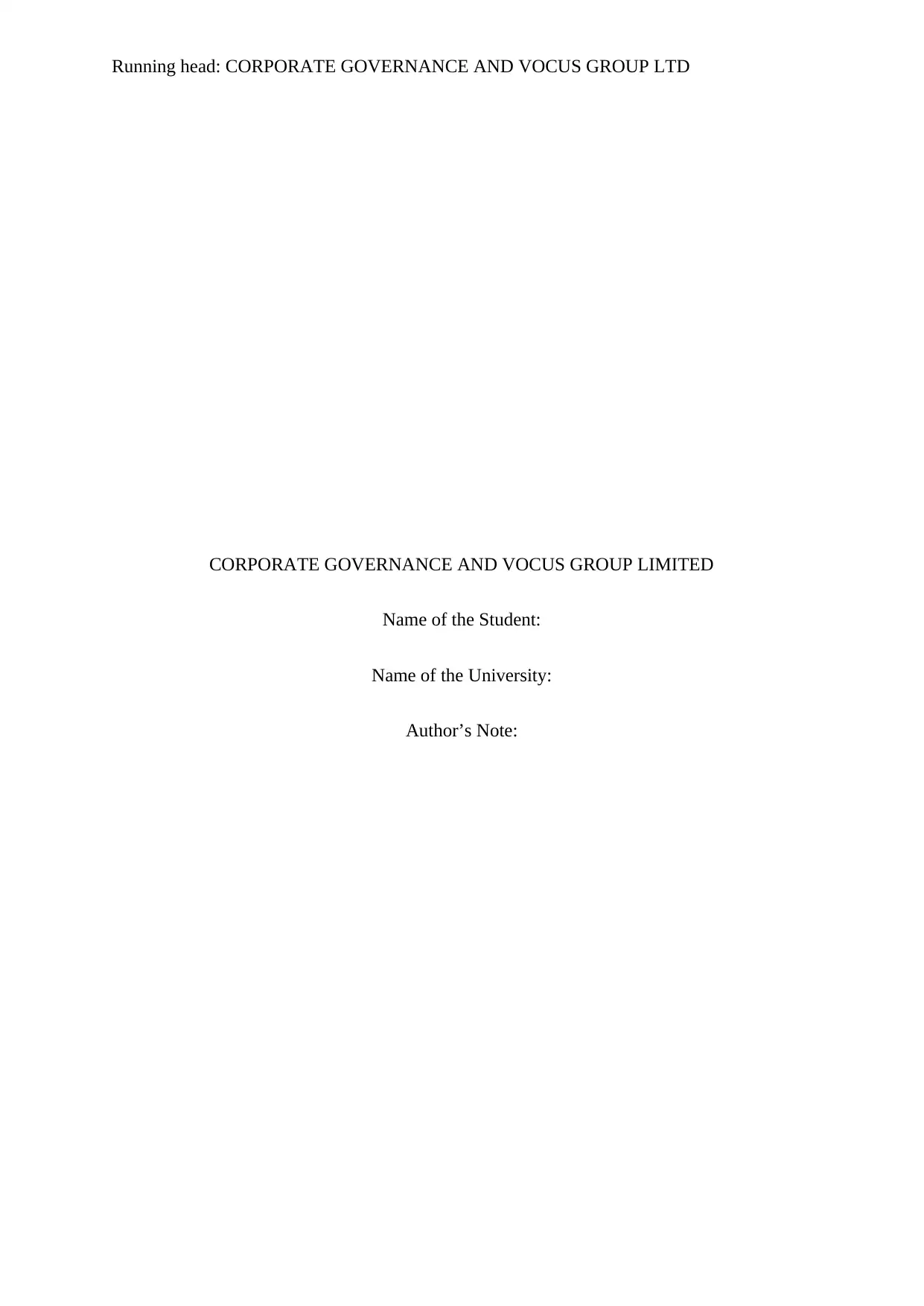
Running head: CORPORATE GOVERNANCE AND VOCUS GROUP LTD
CORPORATE GOVERNANCE AND VOCUS GROUP LIMITED
Name of the Student:
Name of the University:
Author’s Note:
CORPORATE GOVERNANCE AND VOCUS GROUP LIMITED
Name of the Student:
Name of the University:
Author’s Note:
Paraphrase This Document
Need a fresh take? Get an instant paraphrase of this document with our AI Paraphraser
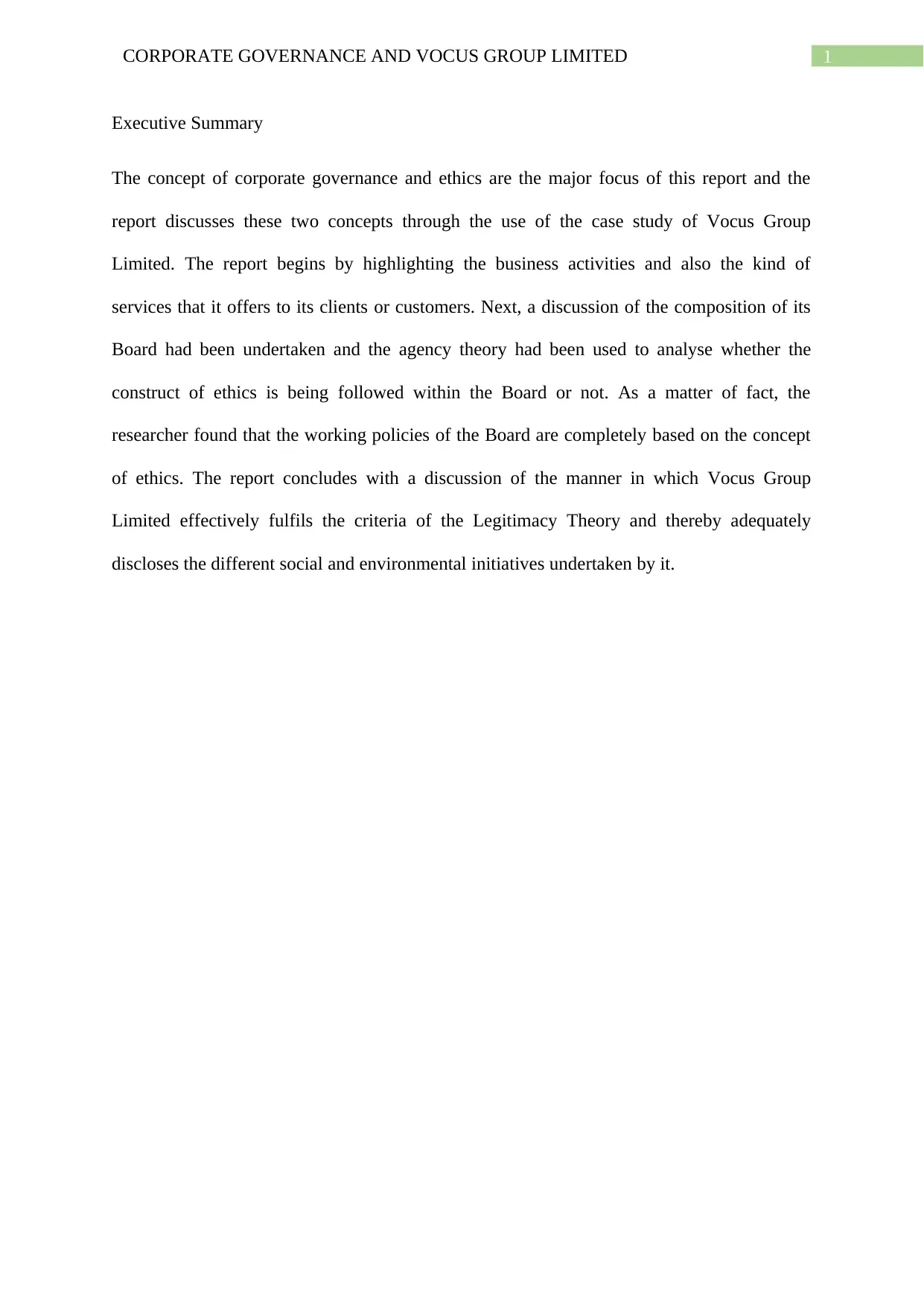
1CORPORATE GOVERNANCE AND VOCUS GROUP LIMITED
Executive Summary
The concept of corporate governance and ethics are the major focus of this report and the
report discusses these two concepts through the use of the case study of Vocus Group
Limited. The report begins by highlighting the business activities and also the kind of
services that it offers to its clients or customers. Next, a discussion of the composition of its
Board had been undertaken and the agency theory had been used to analyse whether the
construct of ethics is being followed within the Board or not. As a matter of fact, the
researcher found that the working policies of the Board are completely based on the concept
of ethics. The report concludes with a discussion of the manner in which Vocus Group
Limited effectively fulfils the criteria of the Legitimacy Theory and thereby adequately
discloses the different social and environmental initiatives undertaken by it.
Executive Summary
The concept of corporate governance and ethics are the major focus of this report and the
report discusses these two concepts through the use of the case study of Vocus Group
Limited. The report begins by highlighting the business activities and also the kind of
services that it offers to its clients or customers. Next, a discussion of the composition of its
Board had been undertaken and the agency theory had been used to analyse whether the
construct of ethics is being followed within the Board or not. As a matter of fact, the
researcher found that the working policies of the Board are completely based on the concept
of ethics. The report concludes with a discussion of the manner in which Vocus Group
Limited effectively fulfils the criteria of the Legitimacy Theory and thereby adequately
discloses the different social and environmental initiatives undertaken by it.
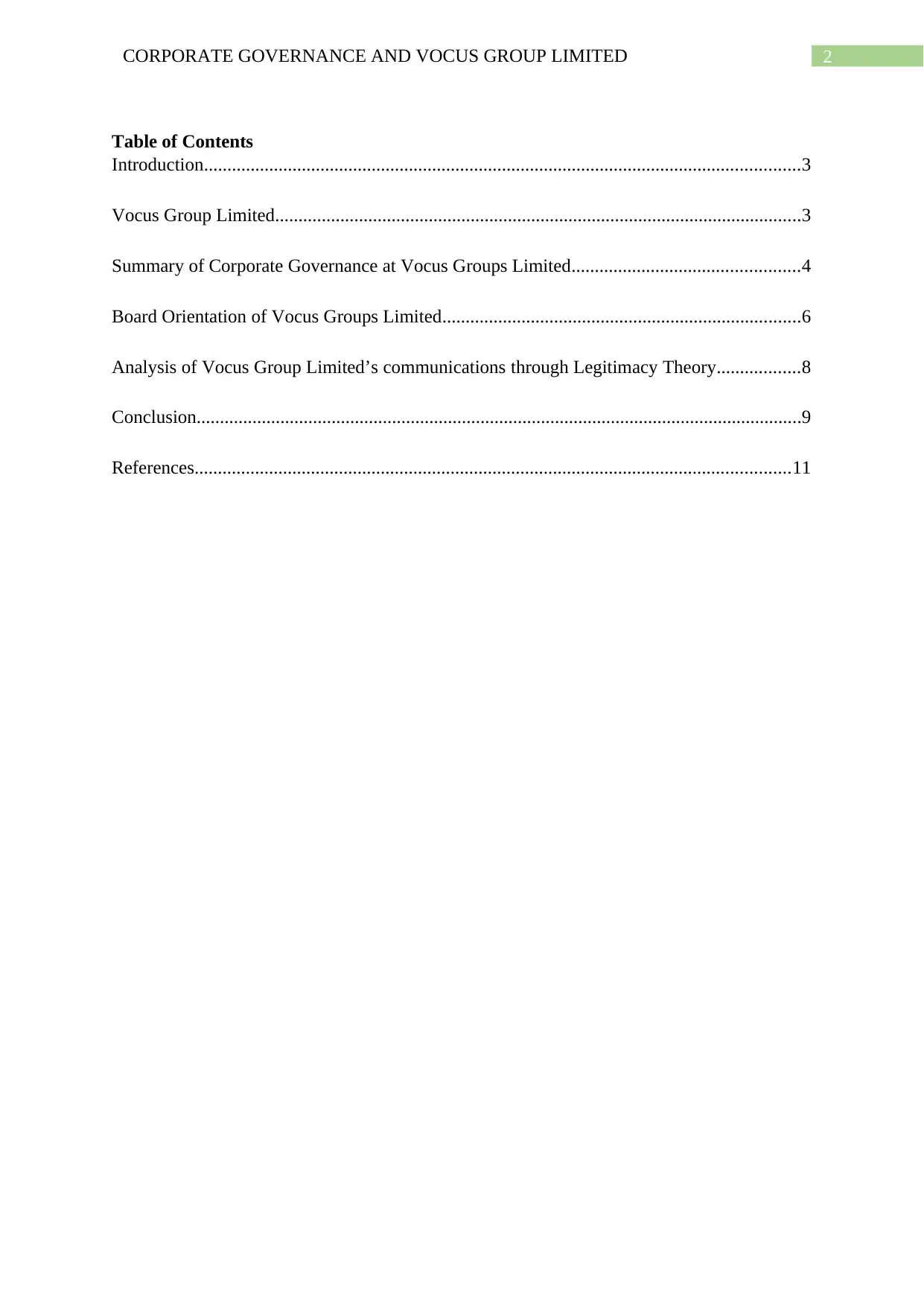
2CORPORATE GOVERNANCE AND VOCUS GROUP LIMITED
Table of Contents
Introduction................................................................................................................................3
Vocus Group Limited.................................................................................................................3
Summary of Corporate Governance at Vocus Groups Limited.................................................4
Board Orientation of Vocus Groups Limited.............................................................................6
Analysis of Vocus Group Limited’s communications through Legitimacy Theory..................8
Conclusion..................................................................................................................................9
References................................................................................................................................11
Table of Contents
Introduction................................................................................................................................3
Vocus Group Limited.................................................................................................................3
Summary of Corporate Governance at Vocus Groups Limited.................................................4
Board Orientation of Vocus Groups Limited.............................................................................6
Analysis of Vocus Group Limited’s communications through Legitimacy Theory..................8
Conclusion..................................................................................................................................9
References................................................................................................................................11
⊘ This is a preview!⊘
Do you want full access?
Subscribe today to unlock all pages.

Trusted by 1+ million students worldwide
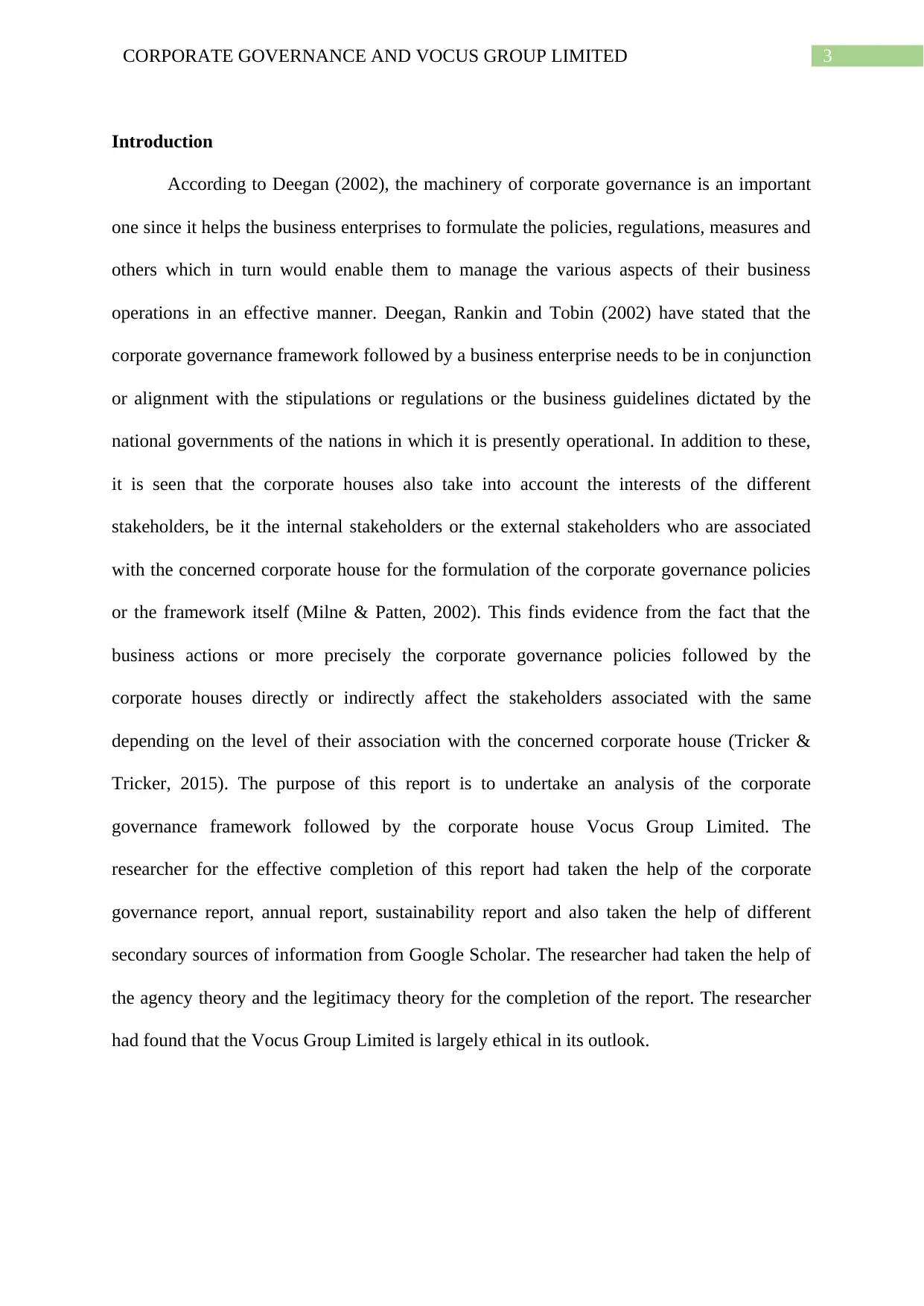
3CORPORATE GOVERNANCE AND VOCUS GROUP LIMITED
Introduction
According to Deegan (2002), the machinery of corporate governance is an important
one since it helps the business enterprises to formulate the policies, regulations, measures and
others which in turn would enable them to manage the various aspects of their business
operations in an effective manner. Deegan, Rankin and Tobin (2002) have stated that the
corporate governance framework followed by a business enterprise needs to be in conjunction
or alignment with the stipulations or regulations or the business guidelines dictated by the
national governments of the nations in which it is presently operational. In addition to these,
it is seen that the corporate houses also take into account the interests of the different
stakeholders, be it the internal stakeholders or the external stakeholders who are associated
with the concerned corporate house for the formulation of the corporate governance policies
or the framework itself (Milne & Patten, 2002). This finds evidence from the fact that the
business actions or more precisely the corporate governance policies followed by the
corporate houses directly or indirectly affect the stakeholders associated with the same
depending on the level of their association with the concerned corporate house (Tricker &
Tricker, 2015). The purpose of this report is to undertake an analysis of the corporate
governance framework followed by the corporate house Vocus Group Limited. The
researcher for the effective completion of this report had taken the help of the corporate
governance report, annual report, sustainability report and also taken the help of different
secondary sources of information from Google Scholar. The researcher had taken the help of
the agency theory and the legitimacy theory for the completion of the report. The researcher
had found that the Vocus Group Limited is largely ethical in its outlook.
Introduction
According to Deegan (2002), the machinery of corporate governance is an important
one since it helps the business enterprises to formulate the policies, regulations, measures and
others which in turn would enable them to manage the various aspects of their business
operations in an effective manner. Deegan, Rankin and Tobin (2002) have stated that the
corporate governance framework followed by a business enterprise needs to be in conjunction
or alignment with the stipulations or regulations or the business guidelines dictated by the
national governments of the nations in which it is presently operational. In addition to these,
it is seen that the corporate houses also take into account the interests of the different
stakeholders, be it the internal stakeholders or the external stakeholders who are associated
with the concerned corporate house for the formulation of the corporate governance policies
or the framework itself (Milne & Patten, 2002). This finds evidence from the fact that the
business actions or more precisely the corporate governance policies followed by the
corporate houses directly or indirectly affect the stakeholders associated with the same
depending on the level of their association with the concerned corporate house (Tricker &
Tricker, 2015). The purpose of this report is to undertake an analysis of the corporate
governance framework followed by the corporate house Vocus Group Limited. The
researcher for the effective completion of this report had taken the help of the corporate
governance report, annual report, sustainability report and also taken the help of different
secondary sources of information from Google Scholar. The researcher had taken the help of
the agency theory and the legitimacy theory for the completion of the report. The researcher
had found that the Vocus Group Limited is largely ethical in its outlook.
Paraphrase This Document
Need a fresh take? Get an instant paraphrase of this document with our AI Paraphraser
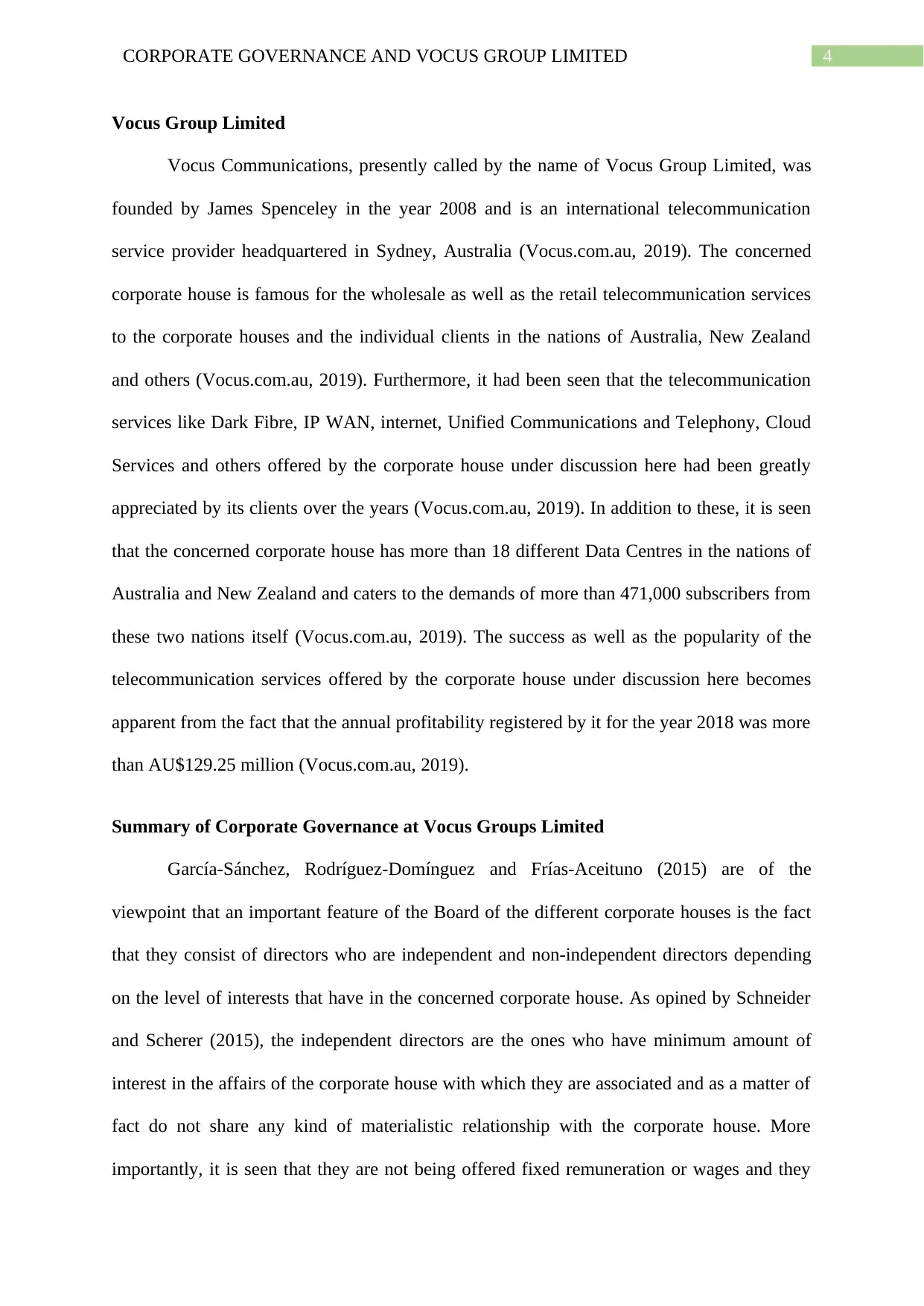
4CORPORATE GOVERNANCE AND VOCUS GROUP LIMITED
Vocus Group Limited
Vocus Communications, presently called by the name of Vocus Group Limited, was
founded by James Spenceley in the year 2008 and is an international telecommunication
service provider headquartered in Sydney, Australia (Vocus.com.au, 2019). The concerned
corporate house is famous for the wholesale as well as the retail telecommunication services
to the corporate houses and the individual clients in the nations of Australia, New Zealand
and others (Vocus.com.au, 2019). Furthermore, it had been seen that the telecommunication
services like Dark Fibre, IP WAN, internet, Unified Communications and Telephony, Cloud
Services and others offered by the corporate house under discussion here had been greatly
appreciated by its clients over the years (Vocus.com.au, 2019). In addition to these, it is seen
that the concerned corporate house has more than 18 different Data Centres in the nations of
Australia and New Zealand and caters to the demands of more than 471,000 subscribers from
these two nations itself (Vocus.com.au, 2019). The success as well as the popularity of the
telecommunication services offered by the corporate house under discussion here becomes
apparent from the fact that the annual profitability registered by it for the year 2018 was more
than AU$129.25 million (Vocus.com.au, 2019).
Summary of Corporate Governance at Vocus Groups Limited
García-Sánchez, Rodríguez-Domínguez and Frías-Aceituno (2015) are of the
viewpoint that an important feature of the Board of the different corporate houses is the fact
that they consist of directors who are independent and non-independent directors depending
on the level of interests that have in the concerned corporate house. As opined by Schneider
and Scherer (2015), the independent directors are the ones who have minimum amount of
interest in the affairs of the corporate house with which they are associated and as a matter of
fact do not share any kind of materialistic relationship with the corporate house. More
importantly, it is seen that they are not being offered fixed remuneration or wages and they
Vocus Group Limited
Vocus Communications, presently called by the name of Vocus Group Limited, was
founded by James Spenceley in the year 2008 and is an international telecommunication
service provider headquartered in Sydney, Australia (Vocus.com.au, 2019). The concerned
corporate house is famous for the wholesale as well as the retail telecommunication services
to the corporate houses and the individual clients in the nations of Australia, New Zealand
and others (Vocus.com.au, 2019). Furthermore, it had been seen that the telecommunication
services like Dark Fibre, IP WAN, internet, Unified Communications and Telephony, Cloud
Services and others offered by the corporate house under discussion here had been greatly
appreciated by its clients over the years (Vocus.com.au, 2019). In addition to these, it is seen
that the concerned corporate house has more than 18 different Data Centres in the nations of
Australia and New Zealand and caters to the demands of more than 471,000 subscribers from
these two nations itself (Vocus.com.au, 2019). The success as well as the popularity of the
telecommunication services offered by the corporate house under discussion here becomes
apparent from the fact that the annual profitability registered by it for the year 2018 was more
than AU$129.25 million (Vocus.com.au, 2019).
Summary of Corporate Governance at Vocus Groups Limited
García-Sánchez, Rodríguez-Domínguez and Frías-Aceituno (2015) are of the
viewpoint that an important feature of the Board of the different corporate houses is the fact
that they consist of directors who are independent and non-independent directors depending
on the level of interests that have in the concerned corporate house. As opined by Schneider
and Scherer (2015), the independent directors are the ones who have minimum amount of
interest in the affairs of the corporate house with which they are associated and as a matter of
fact do not share any kind of materialistic relationship with the corporate house. More
importantly, it is seen that they are not being offered fixed remuneration or wages and they
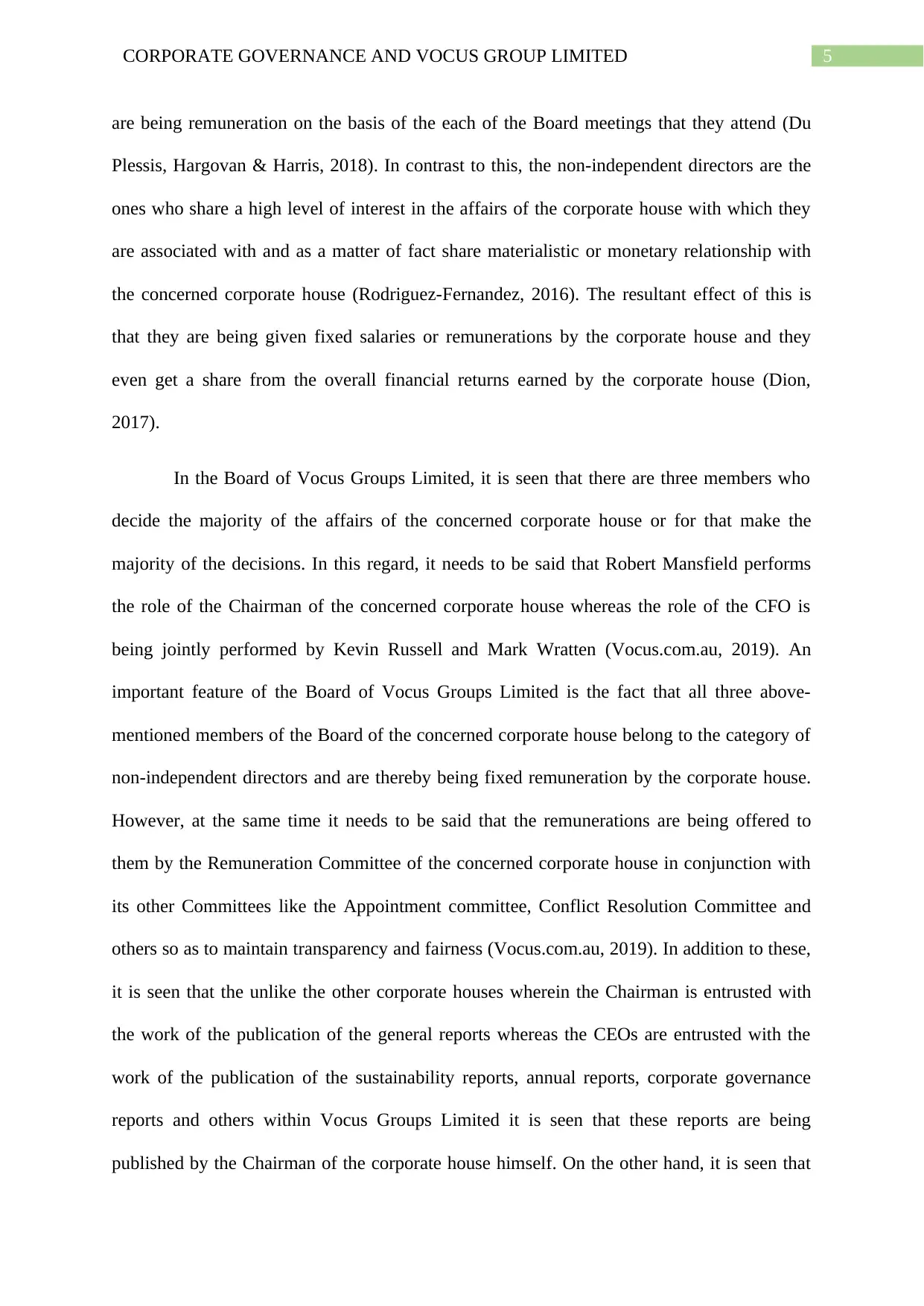
5CORPORATE GOVERNANCE AND VOCUS GROUP LIMITED
are being remuneration on the basis of the each of the Board meetings that they attend (Du
Plessis, Hargovan & Harris, 2018). In contrast to this, the non-independent directors are the
ones who share a high level of interest in the affairs of the corporate house with which they
are associated with and as a matter of fact share materialistic or monetary relationship with
the concerned corporate house (Rodriguez-Fernandez, 2016). The resultant effect of this is
that they are being given fixed salaries or remunerations by the corporate house and they
even get a share from the overall financial returns earned by the corporate house (Dion,
2017).
In the Board of Vocus Groups Limited, it is seen that there are three members who
decide the majority of the affairs of the concerned corporate house or for that make the
majority of the decisions. In this regard, it needs to be said that Robert Mansfield performs
the role of the Chairman of the concerned corporate house whereas the role of the CFO is
being jointly performed by Kevin Russell and Mark Wratten (Vocus.com.au, 2019). An
important feature of the Board of Vocus Groups Limited is the fact that all three above-
mentioned members of the Board of the concerned corporate house belong to the category of
non-independent directors and are thereby being fixed remuneration by the corporate house.
However, at the same time it needs to be said that the remunerations are being offered to
them by the Remuneration Committee of the concerned corporate house in conjunction with
its other Committees like the Appointment committee, Conflict Resolution Committee and
others so as to maintain transparency and fairness (Vocus.com.au, 2019). In addition to these,
it is seen that the unlike the other corporate houses wherein the Chairman is entrusted with
the work of the publication of the general reports whereas the CEOs are entrusted with the
work of the publication of the sustainability reports, annual reports, corporate governance
reports and others within Vocus Groups Limited it is seen that these reports are being
published by the Chairman of the corporate house himself. On the other hand, it is seen that
are being remuneration on the basis of the each of the Board meetings that they attend (Du
Plessis, Hargovan & Harris, 2018). In contrast to this, the non-independent directors are the
ones who share a high level of interest in the affairs of the corporate house with which they
are associated with and as a matter of fact share materialistic or monetary relationship with
the concerned corporate house (Rodriguez-Fernandez, 2016). The resultant effect of this is
that they are being given fixed salaries or remunerations by the corporate house and they
even get a share from the overall financial returns earned by the corporate house (Dion,
2017).
In the Board of Vocus Groups Limited, it is seen that there are three members who
decide the majority of the affairs of the concerned corporate house or for that make the
majority of the decisions. In this regard, it needs to be said that Robert Mansfield performs
the role of the Chairman of the concerned corporate house whereas the role of the CFO is
being jointly performed by Kevin Russell and Mark Wratten (Vocus.com.au, 2019). An
important feature of the Board of Vocus Groups Limited is the fact that all three above-
mentioned members of the Board of the concerned corporate house belong to the category of
non-independent directors and are thereby being fixed remuneration by the corporate house.
However, at the same time it needs to be said that the remunerations are being offered to
them by the Remuneration Committee of the concerned corporate house in conjunction with
its other Committees like the Appointment committee, Conflict Resolution Committee and
others so as to maintain transparency and fairness (Vocus.com.au, 2019). In addition to these,
it is seen that the unlike the other corporate houses wherein the Chairman is entrusted with
the work of the publication of the general reports whereas the CEOs are entrusted with the
work of the publication of the sustainability reports, annual reports, corporate governance
reports and others within Vocus Groups Limited it is seen that these reports are being
published by the Chairman of the corporate house himself. On the other hand, it is seen that
⊘ This is a preview!⊘
Do you want full access?
Subscribe today to unlock all pages.

Trusted by 1+ million students worldwide
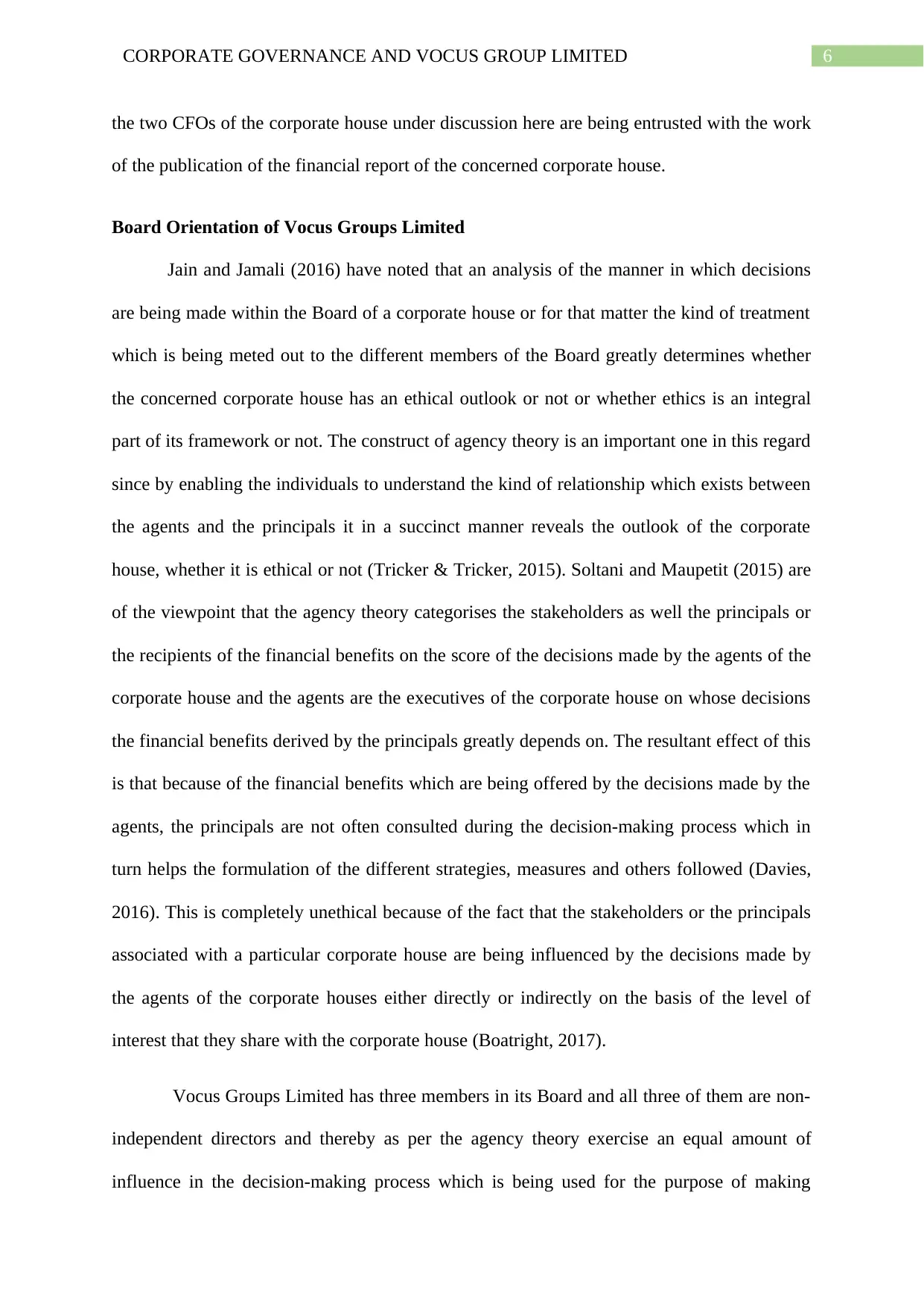
6CORPORATE GOVERNANCE AND VOCUS GROUP LIMITED
the two CFOs of the corporate house under discussion here are being entrusted with the work
of the publication of the financial report of the concerned corporate house.
Board Orientation of Vocus Groups Limited
Jain and Jamali (2016) have noted that an analysis of the manner in which decisions
are being made within the Board of a corporate house or for that matter the kind of treatment
which is being meted out to the different members of the Board greatly determines whether
the concerned corporate house has an ethical outlook or not or whether ethics is an integral
part of its framework or not. The construct of agency theory is an important one in this regard
since by enabling the individuals to understand the kind of relationship which exists between
the agents and the principals it in a succinct manner reveals the outlook of the corporate
house, whether it is ethical or not (Tricker & Tricker, 2015). Soltani and Maupetit (2015) are
of the viewpoint that the agency theory categorises the stakeholders as well the principals or
the recipients of the financial benefits on the score of the decisions made by the agents of the
corporate house and the agents are the executives of the corporate house on whose decisions
the financial benefits derived by the principals greatly depends on. The resultant effect of this
is that because of the financial benefits which are being offered by the decisions made by the
agents, the principals are not often consulted during the decision-making process which in
turn helps the formulation of the different strategies, measures and others followed (Davies,
2016). This is completely unethical because of the fact that the stakeholders or the principals
associated with a particular corporate house are being influenced by the decisions made by
the agents of the corporate houses either directly or indirectly on the basis of the level of
interest that they share with the corporate house (Boatright, 2017).
Vocus Groups Limited has three members in its Board and all three of them are non-
independent directors and thereby as per the agency theory exercise an equal amount of
influence in the decision-making process which is being used for the purpose of making
the two CFOs of the corporate house under discussion here are being entrusted with the work
of the publication of the financial report of the concerned corporate house.
Board Orientation of Vocus Groups Limited
Jain and Jamali (2016) have noted that an analysis of the manner in which decisions
are being made within the Board of a corporate house or for that matter the kind of treatment
which is being meted out to the different members of the Board greatly determines whether
the concerned corporate house has an ethical outlook or not or whether ethics is an integral
part of its framework or not. The construct of agency theory is an important one in this regard
since by enabling the individuals to understand the kind of relationship which exists between
the agents and the principals it in a succinct manner reveals the outlook of the corporate
house, whether it is ethical or not (Tricker & Tricker, 2015). Soltani and Maupetit (2015) are
of the viewpoint that the agency theory categorises the stakeholders as well the principals or
the recipients of the financial benefits on the score of the decisions made by the agents of the
corporate house and the agents are the executives of the corporate house on whose decisions
the financial benefits derived by the principals greatly depends on. The resultant effect of this
is that because of the financial benefits which are being offered by the decisions made by the
agents, the principals are not often consulted during the decision-making process which in
turn helps the formulation of the different strategies, measures and others followed (Davies,
2016). This is completely unethical because of the fact that the stakeholders or the principals
associated with a particular corporate house are being influenced by the decisions made by
the agents of the corporate houses either directly or indirectly on the basis of the level of
interest that they share with the corporate house (Boatright, 2017).
Vocus Groups Limited has three members in its Board and all three of them are non-
independent directors and thereby as per the agency theory exercise an equal amount of
influence in the decision-making process which is being used for the purpose of making
Paraphrase This Document
Need a fresh take? Get an instant paraphrase of this document with our AI Paraphraser
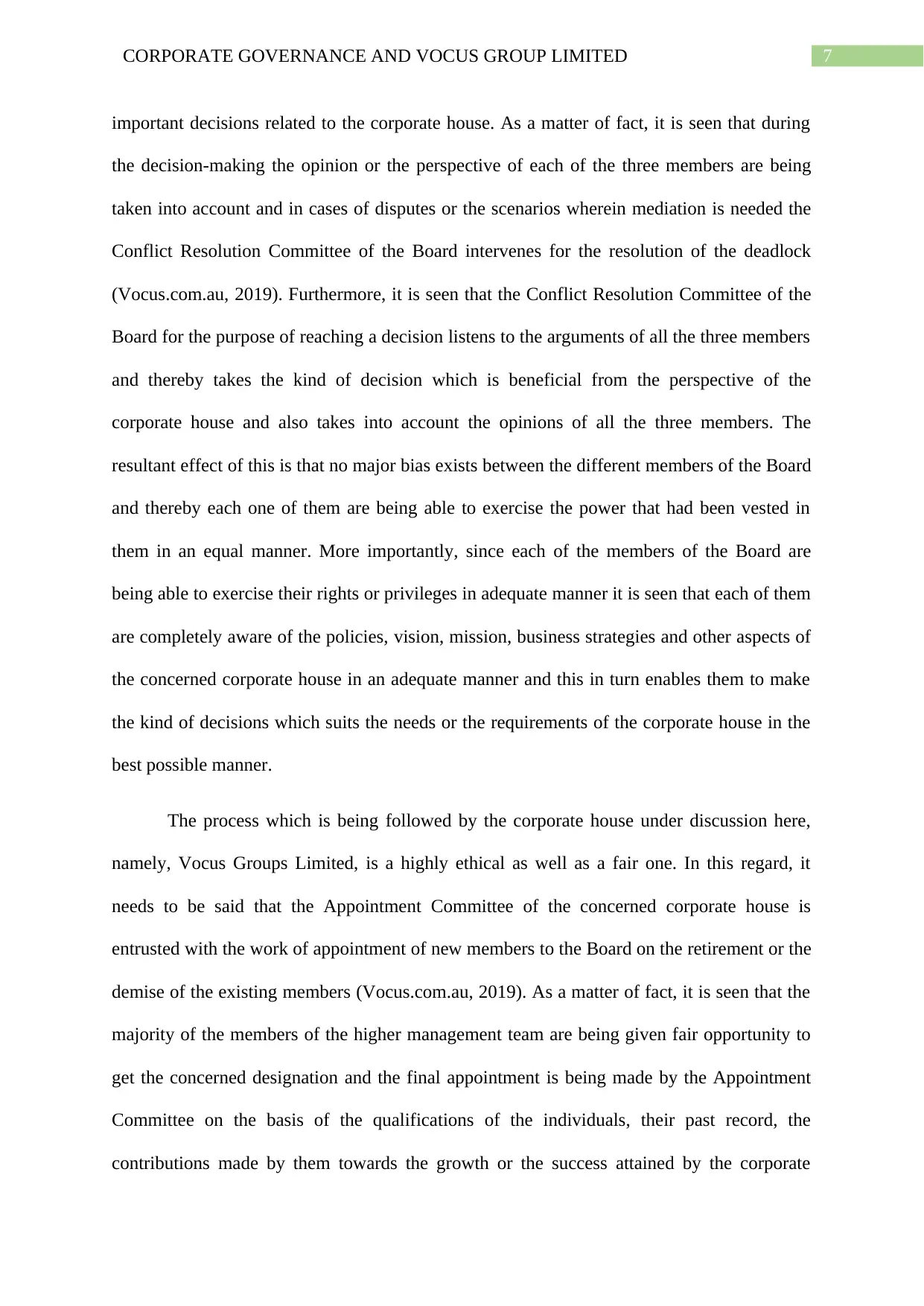
7CORPORATE GOVERNANCE AND VOCUS GROUP LIMITED
important decisions related to the corporate house. As a matter of fact, it is seen that during
the decision-making the opinion or the perspective of each of the three members are being
taken into account and in cases of disputes or the scenarios wherein mediation is needed the
Conflict Resolution Committee of the Board intervenes for the resolution of the deadlock
(Vocus.com.au, 2019). Furthermore, it is seen that the Conflict Resolution Committee of the
Board for the purpose of reaching a decision listens to the arguments of all the three members
and thereby takes the kind of decision which is beneficial from the perspective of the
corporate house and also takes into account the opinions of all the three members. The
resultant effect of this is that no major bias exists between the different members of the Board
and thereby each one of them are being able to exercise the power that had been vested in
them in an equal manner. More importantly, since each of the members of the Board are
being able to exercise their rights or privileges in adequate manner it is seen that each of them
are completely aware of the policies, vision, mission, business strategies and other aspects of
the concerned corporate house in an adequate manner and this in turn enables them to make
the kind of decisions which suits the needs or the requirements of the corporate house in the
best possible manner.
The process which is being followed by the corporate house under discussion here,
namely, Vocus Groups Limited, is a highly ethical as well as a fair one. In this regard, it
needs to be said that the Appointment Committee of the concerned corporate house is
entrusted with the work of appointment of new members to the Board on the retirement or the
demise of the existing members (Vocus.com.au, 2019). As a matter of fact, it is seen that the
majority of the members of the higher management team are being given fair opportunity to
get the concerned designation and the final appointment is being made by the Appointment
Committee on the basis of the qualifications of the individuals, their past record, the
contributions made by them towards the growth or the success attained by the corporate
important decisions related to the corporate house. As a matter of fact, it is seen that during
the decision-making the opinion or the perspective of each of the three members are being
taken into account and in cases of disputes or the scenarios wherein mediation is needed the
Conflict Resolution Committee of the Board intervenes for the resolution of the deadlock
(Vocus.com.au, 2019). Furthermore, it is seen that the Conflict Resolution Committee of the
Board for the purpose of reaching a decision listens to the arguments of all the three members
and thereby takes the kind of decision which is beneficial from the perspective of the
corporate house and also takes into account the opinions of all the three members. The
resultant effect of this is that no major bias exists between the different members of the Board
and thereby each one of them are being able to exercise the power that had been vested in
them in an equal manner. More importantly, since each of the members of the Board are
being able to exercise their rights or privileges in adequate manner it is seen that each of them
are completely aware of the policies, vision, mission, business strategies and other aspects of
the concerned corporate house in an adequate manner and this in turn enables them to make
the kind of decisions which suits the needs or the requirements of the corporate house in the
best possible manner.
The process which is being followed by the corporate house under discussion here,
namely, Vocus Groups Limited, is a highly ethical as well as a fair one. In this regard, it
needs to be said that the Appointment Committee of the concerned corporate house is
entrusted with the work of appointment of new members to the Board on the retirement or the
demise of the existing members (Vocus.com.au, 2019). As a matter of fact, it is seen that the
majority of the members of the higher management team are being given fair opportunity to
get the concerned designation and the final appointment is being made by the Appointment
Committee on the basis of the qualifications of the individuals, their past record, the
contributions made by them towards the growth or the success attained by the corporate
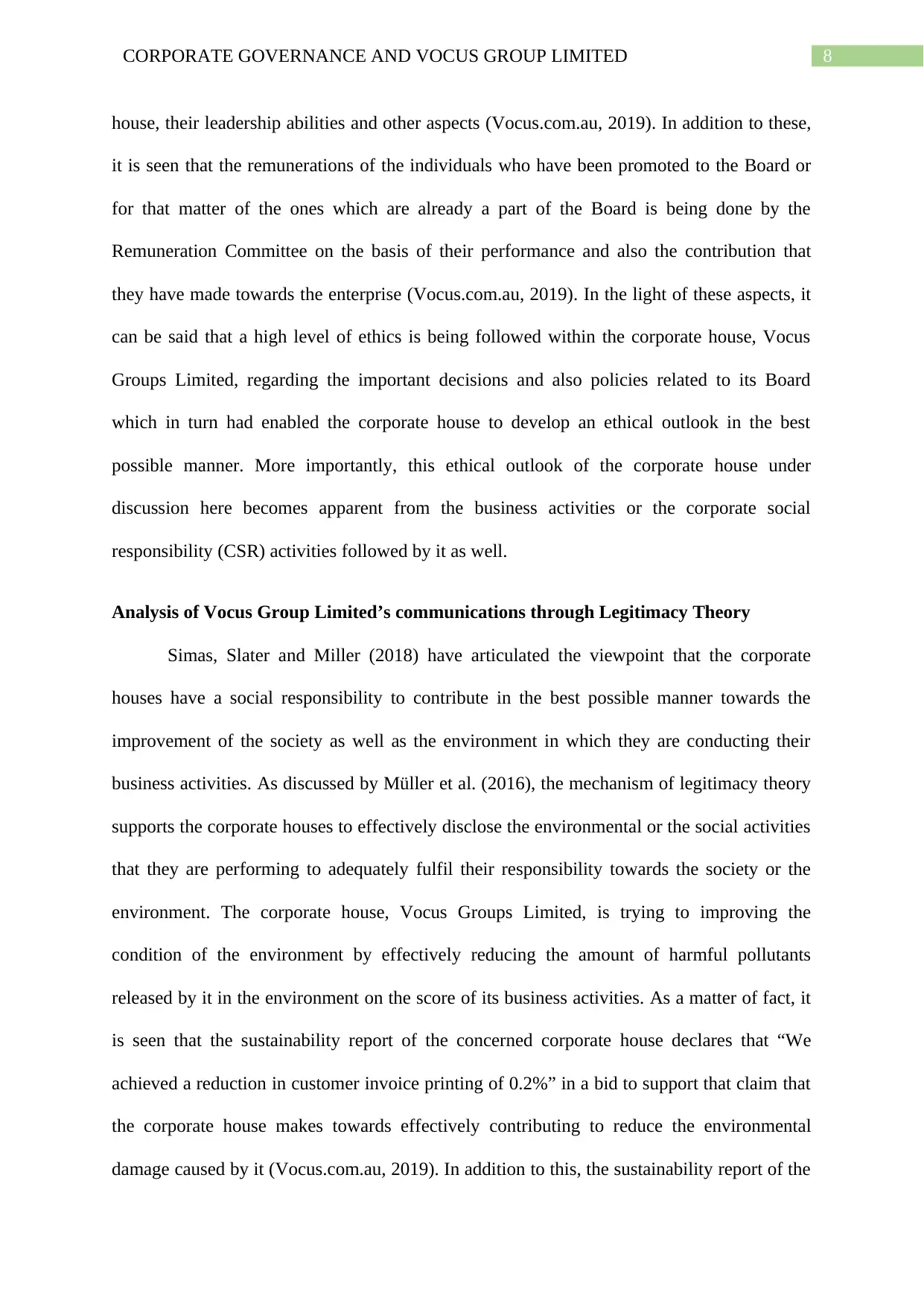
8CORPORATE GOVERNANCE AND VOCUS GROUP LIMITED
house, their leadership abilities and other aspects (Vocus.com.au, 2019). In addition to these,
it is seen that the remunerations of the individuals who have been promoted to the Board or
for that matter of the ones which are already a part of the Board is being done by the
Remuneration Committee on the basis of their performance and also the contribution that
they have made towards the enterprise (Vocus.com.au, 2019). In the light of these aspects, it
can be said that a high level of ethics is being followed within the corporate house, Vocus
Groups Limited, regarding the important decisions and also policies related to its Board
which in turn had enabled the corporate house to develop an ethical outlook in the best
possible manner. More importantly, this ethical outlook of the corporate house under
discussion here becomes apparent from the business activities or the corporate social
responsibility (CSR) activities followed by it as well.
Analysis of Vocus Group Limited’s communications through Legitimacy Theory
Simas, Slater and Miller (2018) have articulated the viewpoint that the corporate
houses have a social responsibility to contribute in the best possible manner towards the
improvement of the society as well as the environment in which they are conducting their
business activities. As discussed by Müller et al. (2016), the mechanism of legitimacy theory
supports the corporate houses to effectively disclose the environmental or the social activities
that they are performing to adequately fulfil their responsibility towards the society or the
environment. The corporate house, Vocus Groups Limited, is trying to improving the
condition of the environment by effectively reducing the amount of harmful pollutants
released by it in the environment on the score of its business activities. As a matter of fact, it
is seen that the sustainability report of the concerned corporate house declares that “We
achieved a reduction in customer invoice printing of 0.2%” in a bid to support that claim that
the corporate house makes towards effectively contributing to reduce the environmental
damage caused by it (Vocus.com.au, 2019). In addition to this, the sustainability report of the
house, their leadership abilities and other aspects (Vocus.com.au, 2019). In addition to these,
it is seen that the remunerations of the individuals who have been promoted to the Board or
for that matter of the ones which are already a part of the Board is being done by the
Remuneration Committee on the basis of their performance and also the contribution that
they have made towards the enterprise (Vocus.com.au, 2019). In the light of these aspects, it
can be said that a high level of ethics is being followed within the corporate house, Vocus
Groups Limited, regarding the important decisions and also policies related to its Board
which in turn had enabled the corporate house to develop an ethical outlook in the best
possible manner. More importantly, this ethical outlook of the corporate house under
discussion here becomes apparent from the business activities or the corporate social
responsibility (CSR) activities followed by it as well.
Analysis of Vocus Group Limited’s communications through Legitimacy Theory
Simas, Slater and Miller (2018) have articulated the viewpoint that the corporate
houses have a social responsibility to contribute in the best possible manner towards the
improvement of the society as well as the environment in which they are conducting their
business activities. As discussed by Müller et al. (2016), the mechanism of legitimacy theory
supports the corporate houses to effectively disclose the environmental or the social activities
that they are performing to adequately fulfil their responsibility towards the society or the
environment. The corporate house, Vocus Groups Limited, is trying to improving the
condition of the environment by effectively reducing the amount of harmful pollutants
released by it in the environment on the score of its business activities. As a matter of fact, it
is seen that the sustainability report of the concerned corporate house declares that “We
achieved a reduction in customer invoice printing of 0.2%” in a bid to support that claim that
the corporate house makes towards effectively contributing to reduce the environmental
damage caused by it (Vocus.com.au, 2019). In addition to this, the sustainability report of the
⊘ This is a preview!⊘
Do you want full access?
Subscribe today to unlock all pages.

Trusted by 1+ million students worldwide
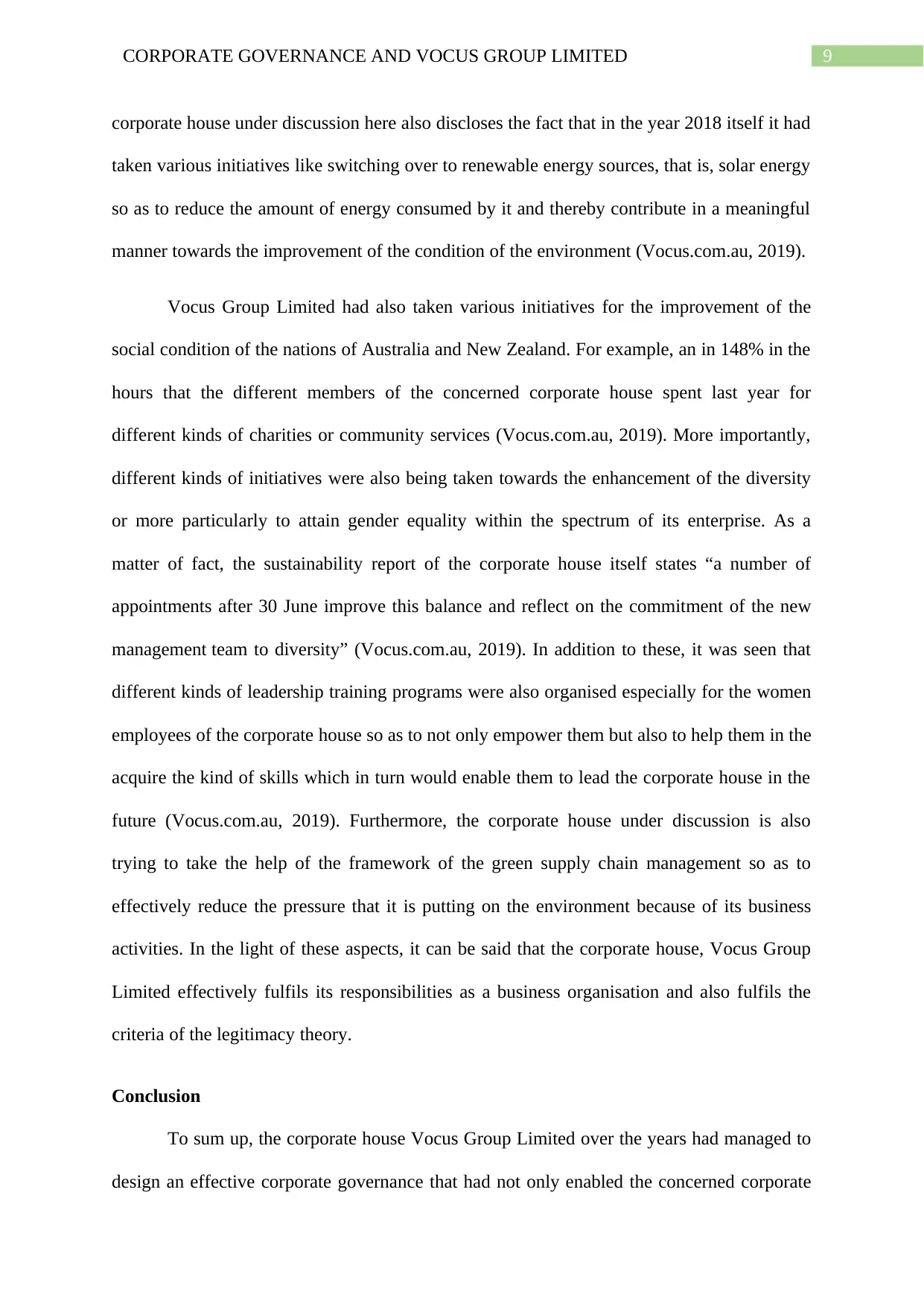
9CORPORATE GOVERNANCE AND VOCUS GROUP LIMITED
corporate house under discussion here also discloses the fact that in the year 2018 itself it had
taken various initiatives like switching over to renewable energy sources, that is, solar energy
so as to reduce the amount of energy consumed by it and thereby contribute in a meaningful
manner towards the improvement of the condition of the environment (Vocus.com.au, 2019).
Vocus Group Limited had also taken various initiatives for the improvement of the
social condition of the nations of Australia and New Zealand. For example, an in 148% in the
hours that the different members of the concerned corporate house spent last year for
different kinds of charities or community services (Vocus.com.au, 2019). More importantly,
different kinds of initiatives were also being taken towards the enhancement of the diversity
or more particularly to attain gender equality within the spectrum of its enterprise. As a
matter of fact, the sustainability report of the corporate house itself states “a number of
appointments after 30 June improve this balance and reflect on the commitment of the new
management team to diversity” (Vocus.com.au, 2019). In addition to these, it was seen that
different kinds of leadership training programs were also organised especially for the women
employees of the corporate house so as to not only empower them but also to help them in the
acquire the kind of skills which in turn would enable them to lead the corporate house in the
future (Vocus.com.au, 2019). Furthermore, the corporate house under discussion is also
trying to take the help of the framework of the green supply chain management so as to
effectively reduce the pressure that it is putting on the environment because of its business
activities. In the light of these aspects, it can be said that the corporate house, Vocus Group
Limited effectively fulfils its responsibilities as a business organisation and also fulfils the
criteria of the legitimacy theory.
Conclusion
To sum up, the corporate house Vocus Group Limited over the years had managed to
design an effective corporate governance that had not only enabled the concerned corporate
corporate house under discussion here also discloses the fact that in the year 2018 itself it had
taken various initiatives like switching over to renewable energy sources, that is, solar energy
so as to reduce the amount of energy consumed by it and thereby contribute in a meaningful
manner towards the improvement of the condition of the environment (Vocus.com.au, 2019).
Vocus Group Limited had also taken various initiatives for the improvement of the
social condition of the nations of Australia and New Zealand. For example, an in 148% in the
hours that the different members of the concerned corporate house spent last year for
different kinds of charities or community services (Vocus.com.au, 2019). More importantly,
different kinds of initiatives were also being taken towards the enhancement of the diversity
or more particularly to attain gender equality within the spectrum of its enterprise. As a
matter of fact, the sustainability report of the corporate house itself states “a number of
appointments after 30 June improve this balance and reflect on the commitment of the new
management team to diversity” (Vocus.com.au, 2019). In addition to these, it was seen that
different kinds of leadership training programs were also organised especially for the women
employees of the corporate house so as to not only empower them but also to help them in the
acquire the kind of skills which in turn would enable them to lead the corporate house in the
future (Vocus.com.au, 2019). Furthermore, the corporate house under discussion is also
trying to take the help of the framework of the green supply chain management so as to
effectively reduce the pressure that it is putting on the environment because of its business
activities. In the light of these aspects, it can be said that the corporate house, Vocus Group
Limited effectively fulfils its responsibilities as a business organisation and also fulfils the
criteria of the legitimacy theory.
Conclusion
To sum up, the corporate house Vocus Group Limited over the years had managed to
design an effective corporate governance that had not only enabled the concerned corporate
Paraphrase This Document
Need a fresh take? Get an instant paraphrase of this document with our AI Paraphraser
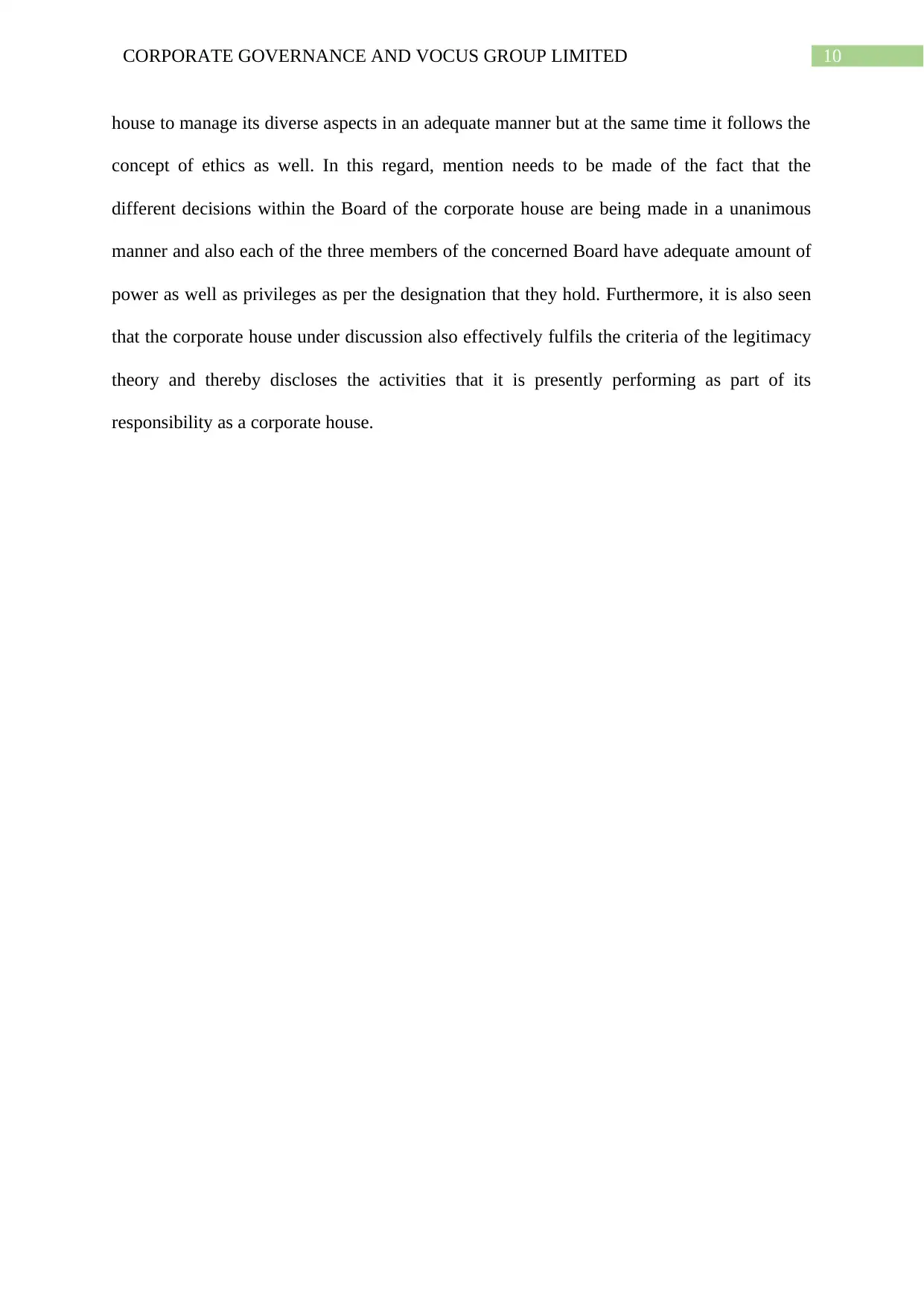
10CORPORATE GOVERNANCE AND VOCUS GROUP LIMITED
house to manage its diverse aspects in an adequate manner but at the same time it follows the
concept of ethics as well. In this regard, mention needs to be made of the fact that the
different decisions within the Board of the corporate house are being made in a unanimous
manner and also each of the three members of the concerned Board have adequate amount of
power as well as privileges as per the designation that they hold. Furthermore, it is also seen
that the corporate house under discussion also effectively fulfils the criteria of the legitimacy
theory and thereby discloses the activities that it is presently performing as part of its
responsibility as a corporate house.
house to manage its diverse aspects in an adequate manner but at the same time it follows the
concept of ethics as well. In this regard, mention needs to be made of the fact that the
different decisions within the Board of the corporate house are being made in a unanimous
manner and also each of the three members of the concerned Board have adequate amount of
power as well as privileges as per the designation that they hold. Furthermore, it is also seen
that the corporate house under discussion also effectively fulfils the criteria of the legitimacy
theory and thereby discloses the activities that it is presently performing as part of its
responsibility as a corporate house.
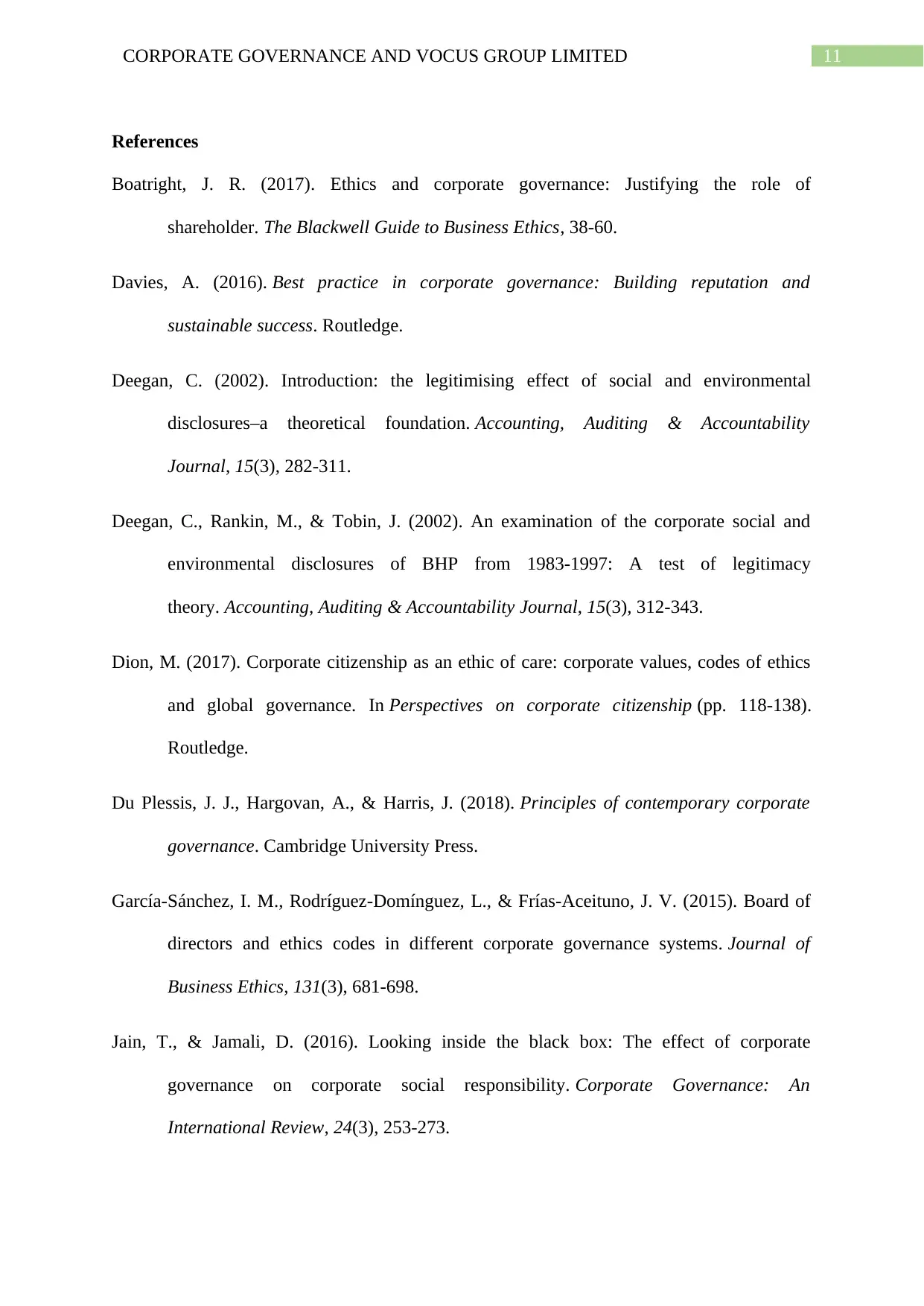
11CORPORATE GOVERNANCE AND VOCUS GROUP LIMITED
References
Boatright, J. R. (2017). Ethics and corporate governance: Justifying the role of
shareholder. The Blackwell Guide to Business Ethics, 38-60.
Davies, A. (2016). Best practice in corporate governance: Building reputation and
sustainable success. Routledge.
Deegan, C. (2002). Introduction: the legitimising effect of social and environmental
disclosures–a theoretical foundation. Accounting, Auditing & Accountability
Journal, 15(3), 282-311.
Deegan, C., Rankin, M., & Tobin, J. (2002). An examination of the corporate social and
environmental disclosures of BHP from 1983-1997: A test of legitimacy
theory. Accounting, Auditing & Accountability Journal, 15(3), 312-343.
Dion, M. (2017). Corporate citizenship as an ethic of care: corporate values, codes of ethics
and global governance. In Perspectives on corporate citizenship (pp. 118-138).
Routledge.
Du Plessis, J. J., Hargovan, A., & Harris, J. (2018). Principles of contemporary corporate
governance. Cambridge University Press.
García-Sánchez, I. M., Rodríguez-Domínguez, L., & Frías-Aceituno, J. V. (2015). Board of
directors and ethics codes in different corporate governance systems. Journal of
Business Ethics, 131(3), 681-698.
Jain, T., & Jamali, D. (2016). Looking inside the black box: The effect of corporate
governance on corporate social responsibility. Corporate Governance: An
International Review, 24(3), 253-273.
References
Boatright, J. R. (2017). Ethics and corporate governance: Justifying the role of
shareholder. The Blackwell Guide to Business Ethics, 38-60.
Davies, A. (2016). Best practice in corporate governance: Building reputation and
sustainable success. Routledge.
Deegan, C. (2002). Introduction: the legitimising effect of social and environmental
disclosures–a theoretical foundation. Accounting, Auditing & Accountability
Journal, 15(3), 282-311.
Deegan, C., Rankin, M., & Tobin, J. (2002). An examination of the corporate social and
environmental disclosures of BHP from 1983-1997: A test of legitimacy
theory. Accounting, Auditing & Accountability Journal, 15(3), 312-343.
Dion, M. (2017). Corporate citizenship as an ethic of care: corporate values, codes of ethics
and global governance. In Perspectives on corporate citizenship (pp. 118-138).
Routledge.
Du Plessis, J. J., Hargovan, A., & Harris, J. (2018). Principles of contemporary corporate
governance. Cambridge University Press.
García-Sánchez, I. M., Rodríguez-Domínguez, L., & Frías-Aceituno, J. V. (2015). Board of
directors and ethics codes in different corporate governance systems. Journal of
Business Ethics, 131(3), 681-698.
Jain, T., & Jamali, D. (2016). Looking inside the black box: The effect of corporate
governance on corporate social responsibility. Corporate Governance: An
International Review, 24(3), 253-273.
⊘ This is a preview!⊘
Do you want full access?
Subscribe today to unlock all pages.

Trusted by 1+ million students worldwide
1 out of 13
Related Documents
Your All-in-One AI-Powered Toolkit for Academic Success.
+13062052269
info@desklib.com
Available 24*7 on WhatsApp / Email
![[object Object]](/_next/static/media/star-bottom.7253800d.svg)
Unlock your academic potential
Copyright © 2020–2026 A2Z Services. All Rights Reserved. Developed and managed by ZUCOL.





